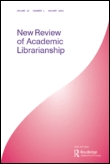
New Review of Academic Librarianship
Scope & Guideline
Advancing the Future of Library Science
Introduction
Aims and Scopes
- Support for Academic Success:
The journal focuses on how academic libraries can enhance student learning and success through effective resource management, teaching strategies, and user engagement. - Inclusivity and Diversity:
A significant aim of the journal is to explore themes of inclusivity, diversity, and anti-racism within academic libraries, promoting practices that honor the voices of marginalized groups. - Technological Adaptation:
Research on the integration of technology in library services is a core area, including the use of AI, digital tools, and the impact of online resources on library usage. - Research Support Services:
The journal addresses the evolving role of academic libraries in providing research support, data management, and information literacy instruction. - Collaborative Practices:
There is a consistent emphasis on collaborative efforts between libraries and academic communities to enhance library services and foster partnerships. - Environmental and Social Responsibility:
The journal also explores the role of academic libraries in addressing climate change and promoting social responsibility through various initiatives.
Trending and Emerging
- Decolonization and Diversity Initiatives:
There is a strong trend towards investigating decolonization in libraries and diversifying library collections and services to better reflect the communities they serve. - Impact of Artificial Intelligence:
Emerging discussions on the role of AI in academic libraries highlight its potential to transform library services, user engagement, and operational efficiencies. - Student-Centered Approaches:
Research emphasizing student voices and their involvement in library decision-making processes is increasingly prevalent, promoting a more inclusive library environment. - Wellbeing and Mental Health Resources:
The integration of wellbeing collections and services within academic libraries is gaining attention, highlighting the role libraries play in supporting student mental health. - Environmental Sustainability:
A growing focus on the role of academic libraries in promoting climate literacy and sustainability initiatives reflects a broader societal concern for environmental issues.
Declining or Waning
- Traditional Library Services:
There is a noticeable decrease in publications focusing solely on traditional library services as the emphasis shifts towards innovative and technology-driven approaches. - Physical Library Space Utilization:
While previously a key area of discussion, the exploration of physical library space utilization has diminished, possibly due to the increased focus on digital resources and remote services. - Print Resource Management:
Discussions surrounding the management of print resources have become less prominent, indicating a trend towards digital collections and electronic resource management. - Library Marketing Strategies:
Research on traditional marketing strategies for libraries is less frequently addressed, as the focus moves towards more integrated and community-centered outreach methodologies. - Stand-Alone Information Literacy Programs:
The concept of isolated information literacy programs is waning, with a growing emphasis on embedding information literacy within broader academic curricula.
Similar Journals
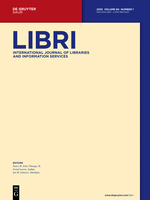
LIBRI-International Journal of Libraries and Information Studies
Connecting Researchers and Professionals in Library ScienceLIBRI - International Journal of Libraries and Information Studies, with ISSN 0024-2667 and E-ISSN 1865-8423, is a premier academic publication in the field of library and information science. Published by the esteemed Walter de Gruyter GmbH in Berlin, Germany, this journal has carved a distinguished place in academic discourse, earning a Q2 ranking in 2023 within its category, which underscores its impact and relevance to the community. With a comprehensive history spanning from 1950 and ongoing coverage until 2024, LIBRI provides a platform for rigorous research and innovative studies that advance the understanding of libraries and information systems globally. Researchers, professionals, and students are invited to engage with its diverse articles that cover a plethora of topics relevant to today’s information landscape. Although not an open-access journal, its contributions are valuable for those seeking to enhance their knowledge and stay updated in a rapidly evolving field.
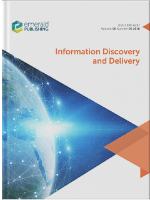
Information Discovery and Delivery
Unveiling the Future of Information Access and PracticesInformation Discovery and Delivery is a leading academic journal published by EMERALD GROUP PUBLISHING LTD, concentrating on the dynamic intersections of Computer Science and Library and Information Sciences. With an ISSN of 2398-6247, this esteemed journal has established its reputation by achieving a commendable Q2 ranking in both fields according to the latest quartiles, reflecting its commitment to advancing knowledge and practice in information discovery processes. With its Scopus ranking placing it in the 83rd percentile for Library and Information Sciences, and the 74th percentile for General Computer Science, the journal is recognized as an influential platform for researchers, professionals, and students alike. Its diverse and scholarly articles, spanning from its inception in 2017 through 2024, aim to explore innovative methodologies, technologies, and best practices that enhance information access and delivery systems. Although the journal is not Open Access, it remains an essential resource for those looking to delve into the latest findings and discussions shaping the landscape of information sciences. Join a community of thought leaders as we navigate the future of information discovery.
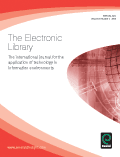
ELECTRONIC LIBRARY
Navigating the Future of Digital LibrariesELECTRONIC LIBRARY, published by EMERALD GROUP PUBLISHING LTD, serves as a pivotal resource in the realms of Library and Information Sciences as well as Computer Science Applications. Established in 1983 and continuing through 2024, this journal showcases critical research and developments that shape modern information practices and the utilization of electronic resources. With a respectable impact factor positioning it in the Q2 quartile for Library and Information Sciences and Q3 for Computer Science Applications, the journal ranks #57 out of 280 in its field, reflecting its significance within the scholarly community. Authors are encouraged to contribute innovative studies that engage with current challenges and technological advancements, ensuring that the ELECTRONIC LIBRARY remains at the forefront of academic discourse. While the journal does not currently offer open access options, it remains an essential subscription-based resource for researchers, professionals, and students seeking to deepen their understanding of digital libraries and information management.

Qualitative & Quantitative Methods in Libraries
Unveiling the Power of Mixed Methods in Library StudiesQualitative & Quantitative Methods in Libraries is an essential journal in the field of library and information science, published by the esteemed International Society for Art, Science and Technology (ISAST). With its ISSN 2241-1925, the journal focuses on the application of both qualitative and quantitative research methodologies in the realm of library studies, offering insights that are crucial for advancing practices and policies within the sector. Although it currently does not offer open access, its rigorously peer-reviewed articles ensure high-quality contributions that cater to researchers, practitioners, and students alike. This journal is committed to fostering innovative research that bridges theory with practice, making it a vital resource for anyone looking to enhance their understanding and application of research methods in library science. With its base in Athina, Greece, it serves as an international platform for scholarly exchange, contributing to the global discourse in the field.
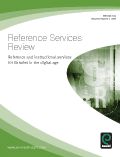
REFERENCE SERVICES REVIEW
Empowering librarians with cutting-edge insights.REFERENCE SERVICES REVIEW, published by Emerald Group Publishing Ltd, is an esteemed journal in the field of Library and Information Sciences and E-learning. With a rich history dating back to 1973, this journal serves as a crucial platform for scholars, practitioners, and students to disseminate and engage with cutting-edge research in reference services and information management. Currently holding a prestigious Q1 ranking in Library and Information Sciences and Q2 in E-learning, it stands out in Scopus rankings as well, being positioned at #76 out of 280, placing it in the 73rd percentile. As a subscription-based journal, REFERENCE SERVICES REVIEW provides readers with robust, peer-reviewed articles that aim to enhance the quality and effectiveness of reference services. Whether you're researching current trends or seeking practical methodologies in library science, this journal is an invaluable resource for advancing knowledge and practice in the field.
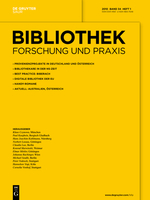
Bibliothek Forschung und Praxis
Elevating Scholarly Dialogue in Information ScienceBibliothek Forschung und Praxis is a distinguished journal in the field of library and information science, published by WALTER DE GRUYTER GMBH. With its ISSN 0341-4183 and E-ISSN 1865-7648, this journal provides a vital platform for researchers, professionals, and students to explore the latest developments, innovative practices, and theoretical advancements in library research. Situated in the academic hub of Berlin, Germany, the journal encourages submissions that address a wide array of topics pertinent to libraries, archives, and information services, aiming to foster dialogue and collaboration within the global academic community. Although it currently does not offer Open Access options, the journal ensures rigorous peer-review processes uphold the integrity and scholarly quality of published works. With a commitment to enhancing the field of library science, Bibliothek Forschung und Praxis plays a crucial role in shaping best practices and promoting deeper understanding among scholars and practitioners alike.
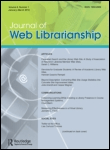
Journal of Web Librarianship
Navigating the Evolving Landscape of Web TechnologiesWelcome to the Journal of Web Librarianship, an esteemed publication dedicated to the evolving landscape of library science and information technology. Published by Routledge Journals, Taylor & Francis Ltd, this journal serves as a vital platform for researchers and professionals to share innovative practices, methodologies, and research findings in the fields of Library and Information Sciences and Computer Science Applications. With an impressive impact factor reflected in its 2023 rankings—Q1 in Library and Information Sciences and Q2 in Computer Science Applications—the journal is well-positioned to influence the discourse and development within these disciplines. Since its inception in 2007, the Journal of Web Librarianship has continually contributed to the academic dialogue, ensuring a comprehensive understanding of the critical role that web technologies play in library services. Though it is not an open-access journal, it remains an invaluable resource for those dedicated to advancing the practice and theory of web librarianship. Join us in exploring the intersections of information and technology as we work towards a more informed society.

Turkish Librarianship
Connecting Scholars and Practitioners GloballyTurkish Librarianship is a distinguished open-access journal published by the Turkish Librarians Association, dedicated to the scholarly examination of library and information science. Since its inception in 1987, the journal has played a vital role in promoting research, innovative practices, and knowledge sharing within the field. By providing a platform for academics, practitioners, and students, Turkish Librarianship facilitates discussions that intersect with current trends and challenges in librarianship both locally and globally. The journal draws attention to various aspects of information management, preservation practices, digital libraries, and the evolving role of librarians in a rapidly changing landscape. With an ISSN of 1300-0039 and an E-ISSN of 2147-9682, the journal aims to enrich the academic discourse and serve as a pivotal resource for those engaged in library sciences, ensuring accessibility through its open-access model. This commitment to free dissemination of knowledge not only enhances the journal’s visibility but also underscores its significance in fostering collaborative research and development in the area.
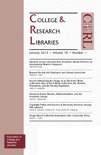
COLLEGE & RESEARCH LIBRARIES
Advancing Library Scholarship Since 1939COLLEGE & RESEARCH LIBRARIES, published by the Association of College & Research Libraries, stands as a pivotal platform in the field of Library and Information Sciences. With an impressive Q1 ranking and a Scopus rank of 78 out of 280, it sits in the 72nd percentile among its peers, reflecting its significant contribution to academic scholarship. The journal, in circulation since 1939 and with *Open Access* status since its inception, is committed to disseminating high-quality research and practical insights for librarians, information professionals, and researchers. Based in the heart of Chicago, the journal provides a comprehensive overview of trends, challenges, and innovations within the library and information sector. Covering a broad spectrum of topics with converged years reflecting a rich historical context (from 1946 to 1947 and from 1987 to 2024), it facilitates discourse among practitioners and scholars aiming to advance the effectiveness of library services. Whether you are a researcher seeking to explore new methodologies or a student striving to stay informed of the latest industry developments, COLLEGE & RESEARCH LIBRARIES is your essential resource.
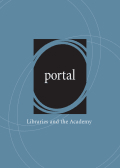
PORTAL-LIBRARIES AND THE ACADEMY
Elevating Academic Discourse in Library and Information SciencePORTAL: Libraries and the Academy is an esteemed academic journal published by Johns Hopkins University Press, focusing on the intersection of library and information science, academic practice, and scholarly communication. With an ISSN of 1531-2542 and an E-ISSN of 1530-7131, this journal offers rigorous peer-reviewed research essential for librarians, researchers, and information professionals committed to enhancing academic libraries and fostering innovative practices in higher education. It holds a strong position in its field, ranking in the 61st percentile within Social Sciences and Library and Information Sciences, and categorized as Q2 in both Development and Library and Information Sciences for 2023. Though the journal is not Open Access, its content is invaluable for anyone interested in staying abreast of the latest trends and challenges in library services and academic environments. Since its inception in 2001, PORTAL has continuously contributed to the discourse on the evolving role of libraries in academia, making it a critical resource for those striving to bridge the gap between information access and higher education pedagogy.